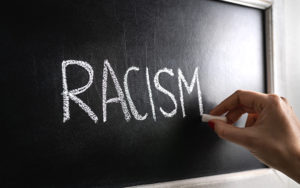By Chris Turner
cturner@tnbaptist.org
 “Are you gonna let that n—r coon sit in our class?’ a boy shouted at me. ‘We can kick the crap out of this n—-r. Look, it’s 20 of us and one of her. They ain’t nothing but animals …Go back where you came from.’ ” — From Warriors Don’t Cry
“Are you gonna let that n—r coon sit in our class?’ a boy shouted at me. ‘We can kick the crap out of this n—-r. Look, it’s 20 of us and one of her. They ain’t nothing but animals …Go back where you came from.’ ” — From Warriors Don’t Cry
I don’t recall ever reading a book as emotionally taxing as, Warriors Don’t Cry, by Melba Pattillo Beals, one of the “Little Rock Nine” who integrated Central High School in 1957. The amount of physical brutality and emotional abuse those children — children my daughter’s age — faced every day for the entire school year is incomprehensible. They endured attempted lynchings, beatings, acid in the eyes, constantly being spit on, being trapped in bathroom stalls while white students stood on toilets in adjacent stalls and rained burning paper on them, and so much more, just because they were black.
The cruelty was inhumane; it was satanic. At times, Melba’s story physically nauseated me. White parents and their children went to extremes to drive them from Central High. For example, parents employed Ku Klux Klan psychologists to coach the students on how to make life hell for Melba and her classmates. The book is a raw look at racism, prejudice and segregation in the South in the 1950s.
What equally sickens me is that today we are walking a once worn path that leads us back to Jim Crow America. Let’s be honest — racism in America never went away. It has lurked in society’s shadows for decades, but the ugliness of a bygone era is anything but gone. That cultural wound is again laid open and is oozing its prejudicial hate. Yes, the combinations of racism flow in many directions, but the white supremacy movement is surging in boldness, dragging us backwards in search of its glory years while adding 21st century sophistication.
The foundation of prejudice is rooted in pride that gives birth to hate. Merriam-Webster defines prejudice as, “an irrational attitude of hostility directed against an individual, a group, a race, or their supposed characteristics.” Racism is, “a belief that race is the primary determinant of human traits and capacities and that racial differences produce an inherent superiority of a particular race.”
With exceptions, confessing white Christians of previous generations collectively refused to renounce the type of hatred Melba faced, and way too many either participated in or tacitly condoned the ugliness. For us now to excuse the behavior then by saying, “That’s just the way it was at the time,” is inexcusable. Hatred in the heart has never been acceptable at any time by any biblical standard. Jesus made that clear when he said if we harbor hate in our hearts, we are guilty of murder (Matthew 5:21-22).
Jesus also tells us (Luke 6:43-45) that the evil a person speaks comes from the overflow of what is stored up in the heart. Unfortunately, contemporary rhetoric smacks of historic familiarity. Google the expression, “Go back where you came from.” The statement dates back to 1798 and has always been a racially prejudicial insult targeting minorities and immigrants. Its spirit is derisory. Today’s white supremacy groups — and many others not nearly that radical — are shouting that statement at non-whites just like the boy in Melba’s class shouted it at her. As demeaning as that verbiage is to individuals, the greater threat is that such prejudice will once again be normalized in our culture, dragging us all back where we came from; back to an age of intense division, extreme inequality, hatred and violence. We already see cracks in the fragile cultural dam that restrains such attitudes, weakened under the pressure of racist rhetoric and unspeakable hate crimes targeting blacks and minorities off all nationalities. America cannot afford for that dam to burst or any gains made in race relations through the years will wash away.
So, racism must be stopped, and Christians must lead the charge. We cannot change the past, but we can influence the future. We mustn’t passively stand by and watch as others target minorities and ethnic peoples like the untold thousands who stood by and watched Melba and her classmates arrive at Little Rock Central and nearly be lynched by a belligerent mob. Passivity is participation.
Christ followers are called to be the standard. Isaiah 5 describes God as looking for His people to reflect His character; to be people who seek justice and pursue righteousness for the purpose of making the gospel known among the very people who are the objects of hatred. No particular race governs the ground at the foot of the cross, and therefore none has claim in determining who is welcome there. One cannot profess love for Christ while simultaneously hating people of a different color or nationality. Jesus is clear: All are welcome.
So, where do we begin? First, recognize there is no room for racism in the Christian heart.
Next, be open minded enough to watch a documentary about race or read a book like Warriors Don’t Cry. Allow the Holy Spirit to reveal if there may be any latent prejudice within yourself.
Then, seek out someone of another race and build a relationship with them. Hear their story. Ask about the challenges they’ve faced. Attach a person — a friend — to the racial issue.
Voice your opposition to racism. Be faithful to consistently make even a small difference right where you are so that your difference contributes to others making a small difference that collectively makes a big difference.
If you are a Christian leader, lead in word and deed from your position of authority.
Share the gospel with a spiritually dark world, recognizing the only way to truly resolve racism is through the saving grace of the gospel.
If we as a society go back where we came from, the sin will also stain the hands of those who did nothing to stop it. History is waiting to record how this generation — our generation — of Christians responds to today’s racial prejudice. What if rather than being remembered for complacency or participation, our posterity remembers us as people who, in the face of racial tension, “Let their lights so shine before others that people saw their good works and gave glory to God in heaven” (Matthew 5:16).
Christian, our time is now. The world is watching. What will we do with what we biblically know? — Turner is director of communications for the Tennessee Baptist Mission Board.

